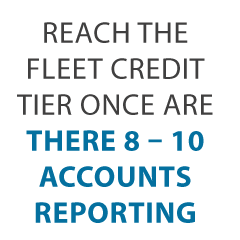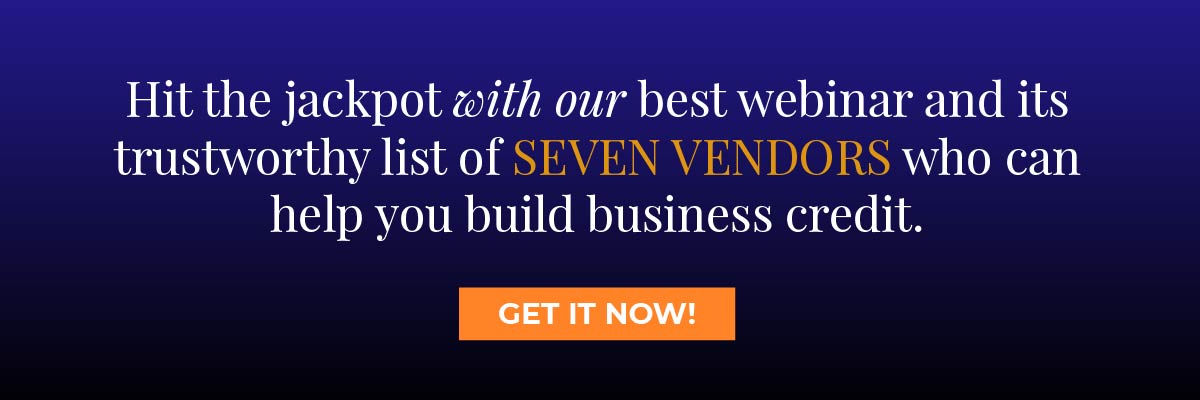- Connect With Us!
- (877) 600-2487
- info@creditsuite.com
Amazing Business Credit for Trucking, Part 2
Published By Janet Gershen-Siegel at June 10th, 2018
Business Credit for Trucking is Within Your Reach
Are you looking for business credit for trucking, and starting a business? We can help.
Why, exactly, do you need business credit for trucking companies? We’ve got the answers here – business credit is good for all business and not just brick and mortar companies! Here is part 2 of our two-part look at this topic.
Business Credit for Trucking: Get a D-U-N-S Number
Make sure your business is listed with Dun and Bradstreet. If it isn’t, then get a D-U-N-S Number. This number starts the process of building your business credit profile with them. Your D-U-N-S # will also play an important role in enabling your business to borrow without a personal guarantor. You can get your D-U-N-S number here: dnb.com. And you can also enroll for the DNBi SelfMonitor to monitor your credit. A subscription is $39-99/month.
And check out creditsuite.com/monitoring for the lowest-price monitoring. We can save you 90%!
Business Credit for Trucking Get Your Other Business Credit Reports
Our business finance suite includes monitoring.
Don’t want to take the plunge just yet? Then visit smartbusinessreports.com for a copy of your Experian Smart Business report. It costs $49-99. Learn how many trade lines are reporting, see if you have a business credit score assigned, see if you have an active Experian Business Profile, and check on recent inquiries.
Buy a copy of your Equifax Small Business Credit Report here: equifax.com/small-business/credit-report/en_sb. It is $99.95 for a full report.
Business Credit for Trucking: Start with the Vendor Credit Tier
This is the start of business credit for trucking companies.
It is when a vendor extends a line of credit to your business on ‘Net 15, 30, 60 or 90’ day terms. This means you can buy their products or services up to a maximum dollar amount. And then you have 15, 30, 60 or 90 days to pay the bill in full.
So if you’re set up on Net 30 terms and bought goods today, then payment is due within the next 30 days. Get products for your business needs and defer payment on those for 30 days, thereby easing cash flow. Some vendors will approve a company for Net 30 payment terms upon verification of as little as an EIN and a 411 listing.
True Starter Vendors
Here are some vendors which will approve your business for initial credit even if you have no credit now:
- Quill Office Supplies
- Grainger
- Wells Fargo Secured Credit Card
Always apply first without using your Social Security Number. Some vendors will request it and may even tell you on the phone they need to have it, but submit first without it. Note: a Social Security Number is required for business loans but not for initial vendor credit building.
Some vendors require an initial prepaid order before they can approve your business for terms. When your first Net 30 account reports your trade line to Dun and Bradstreet, the D-U-N-S system will automatically activate your file if it isn’t already. This is also true for Experian and Equifax.
Help Yourself with On-Time Payments
Pay all Net 30 vendor accounts in full and on time. Be patient and allow time for the vendors’ reporting cycles to get into the reporting systems. It typically takes 3 cycles of Net accounts reporting to build credit scores. Most merchants and major retailers offer business credit, but don’t advertise it. However, there is no benefit to the merchant to promote credit with no personal liability if a business owner is willing to take on that liability. So they don’t promote their business credit cards and regularly request an SSN.
You must have a total of at least five (5) Net 30 day pay accounts reporting although eight (8) are better, to move to the next tier.
Business Credit for Trucking: Attain the Retail Credit Tier
 After you establish 5 – 8 trade lines by using vendor accounts, getting revolving accounts is the next step. These are cards which a business owner can use and they don’t have to pay the full balance owed each month.
After you establish 5 – 8 trade lines by using vendor accounts, getting revolving accounts is the next step. These are cards which a business owner can use and they don’t have to pay the full balance owed each month.
Retail credit tier approvals will start coming from stores. You must get store revolving credit before you the business owner can start getting Visa, MC, and Amex-type cards. Most stores will not approve a business owner for business credit unless the owner has an established credit profile and score, much like in the consumer world. Vendor accounts must be used first to establish a profile and score, and then your business can get store credit. It usually takes just 90 days or less to establish a score and profile with trade lines.
Most major stores offer business credit including: Racetrac, the Fuelman MasterCard, Ally Car Financing, and Phillips 66/Conoco/76 Commercial.
Once 10 total accounts are reporting, a business owner can then start applying for Visa, MC, and Amex-type credit. Approval amounts will be equivalent to the highest credit limit account on the business report.
Therefore, try to have 10 accounts with at least one of them having a $10,000 high limit. Keep using the credit, and keep applying for more, and talk with credit providers to raise credit limits. If you do this, your business credit will keep growing until you can get higher limit credit lines, typically within 6 – 12 months.
Business Credit for Trucking: Getting to the Fleet Credit Tier
Once you have 10 – 15 accounts, you can start to get approved for fleet credit and auto vehicle financing. You must have at least one account with a $10,000 high credit limit to get approved for most fleet credit sources.
Plus you should have higher scores, 75 or higher with Dun and Bradstreet. This score just confirms you pay your bills on time. Fleet credit is used for everything to do with company vehicles and can be used at multiple locations. Its uses include fuel, and vehicle repair and maintenance.
Business Credit for Trucking: Going Beyond the Fleet Credit Tier
As you keep building more business credit, you’ll qualify for more high-limit accounts. Most loans will require a personal guarantee and credit check for approval.
And you will need well over 20 reported accounts, a higher number of employees, and higher revenue and profits to get loans without these. Being responsible with fleet credit will lead directly to getting vehicle financing.
Business Credit for Trucking: Unsecured Credit
This is another viable option. Unsecured credit is not secured with collateral. Good personal credit gets you unsecured credit cards with a personal guarantee; this usually means a 685 score or better. Good business credit gets you unsecured credit cards with no personal guarantee. The amount you can fund is often very high, as in $10,000 – 50,000, and you can get it in 1 – 4 weeks.
You can also get cash flow-based lending; these are short term loan of 6-18 months, with amounts up to $1 million. The loan amounts are equal to 8 – 12% of annual revenue, with rates of 10 – 45%. A 520 credit score is accepted, but good bank statements are necessary.
Business Credit for Trucking: Revenue Loans and Lines
A revenue loan (or revenue-based loan) is an alternative type of loan. Unlike a bank loan, it doesn’t require collateral or significant assets. And unlike angel investing or venture capital, the money isn’t handed over in exchange for a piece of the business. Instead, the loan (or credit line) is paid back as a percentage of incoming revenue. See: https://en.wikipedia.org/wiki/Revenue-based_financing
Revenue-Based Financing Details
The lender (investors, really) take an equity warrant which means they have a fixed price if they want to buy stock in the company until an expiration date. And the business owner does not need to back the loan with their own personal assets. No valuation is done on the business’s assets.
All that is needed:
- The business has to be generating revenue
- It has to have good gross margins to be able to afford the payments
One way to get revenue-based financing is via crowdfunding platforms. Interest paid is often a tax deduction for the business. Costs tend to be higher than with traditional bank loans. It’s not for very early stage startups, by definition. But it can be a good choice for a company about 2 – 4 years old, with revenue coming in but banks still aren’t offering loans.
Fundbox
Our favorite provider is Fundbox. It’s suitable option for short-term financing. The nitty gritty is you’d be borrowing on a line of credit to be repaid weekly for up to 12 weeks. This is accomplished via automatic deductions from your business bank account. $1,000 – $100,000 is available. There are no minimum credit score requirements.
Requirements:
- Six or more months in business
- Annual revenue of $25,000 or more
- The business must have business checking account
Find them online at: https://fundbox.com/lines-credit.
Business Credit for Trucking: Takeaways
You have a lot of options when it comes to getting business credit for trucking companies.

 " class="attachment-blog-single size-blog-single wp-post-image" alt="Get Business Credit Cards for New Businesses Credit Suite-Business Line of Credit Decoded" title="Get Business Credit Cards for New Businesses">>
" class="attachment-blog-single size-blog-single wp-post-image" alt="Get Business Credit Cards for New Businesses Credit Suite-Business Line of Credit Decoded" title="Get Business Credit Cards for New Businesses">>